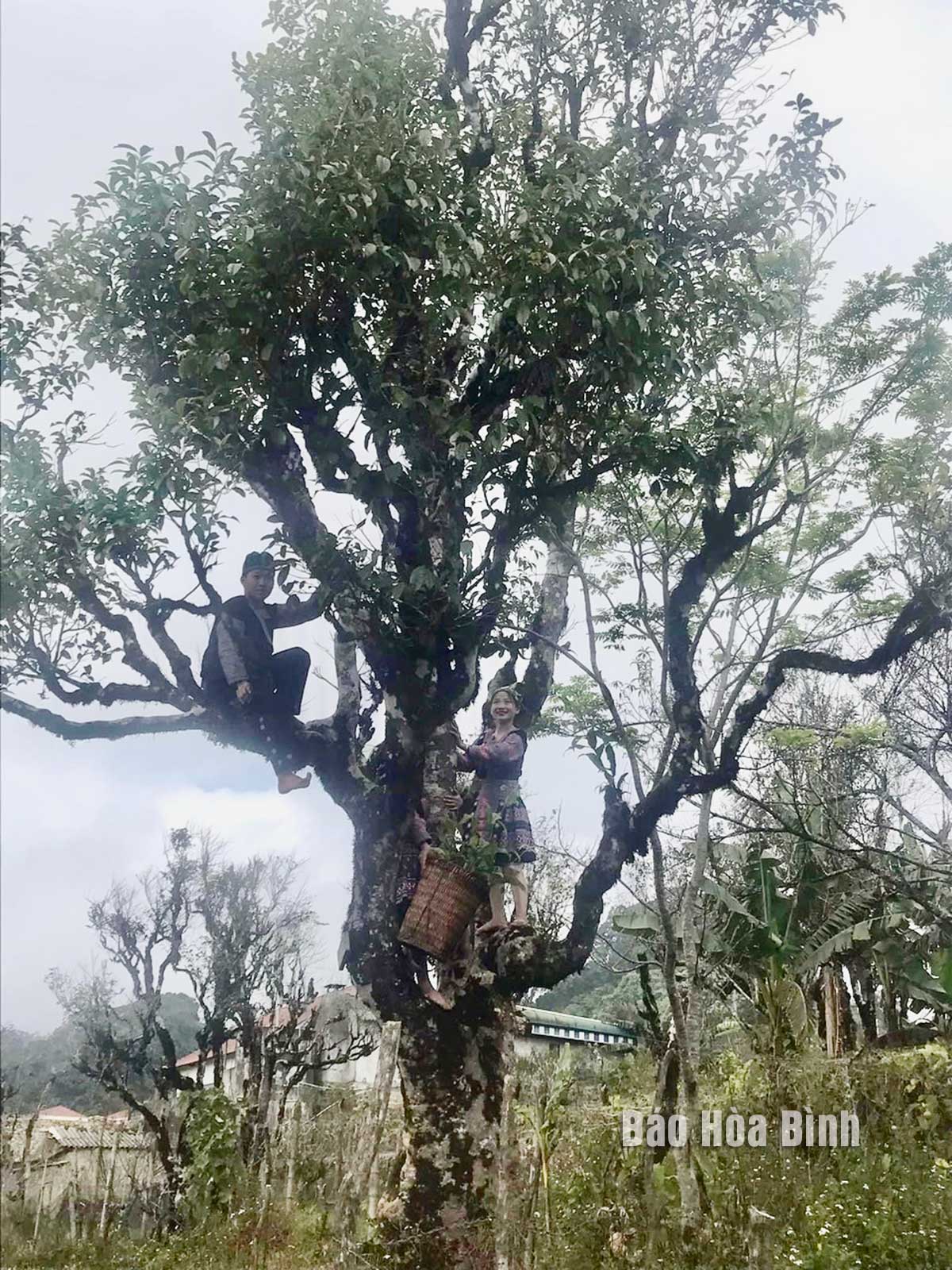
In Pa Co commune of Mai Chau district, apart from 82ha of 'shan tuyet' teas grown several decades ago, there are also ancient plants aged more than 100 years, mostly in Pa Hang Lon and Pa Co hamlets. The local tea with its distinctive flavour has become a consumer preference. Besides, the ancient plants are also favourite check-in places of tourists at present.
Residents in Pa Co hamlet in Pa Co commune, Mai Chau district, harvest 'shan tuyet' tea buds from old plants.
Pa Co commune is blessed with a cool climate,
foggy and cold winter, and high humidity in forest, which are favourable
conditions for teas to grow and acquire special quality. In its Pa Hang Lon hamlet, the ancient plant
area is surrounded by forest. Villagers said most of the ancient plants here
are more than 100 years old.
Mua A Senh, a 93-year-old man in Pa Hang Lon
hamlet, said the plants grow wildly, and no one knows when they came into
being. In the past, people often picked and dried fresh buds to use as a daily
beverage and as a gift for distinguished guests. Tea has formed part of the
daily life and culture of the local Mong ethnic people for hundreds of years,
and drying tea is also a craft dating back that long.
The ancient plants in Pa Co commune belong to
the variety of 'shan tuyet', whose buds are covered with as-white-as-snow hairs
that still remain even after being dried. Taking a sip of the clear yellow
drink, people can feel its light bitter and fragrant taste with sweetness still
lingering for a long time.
Sung A Pao, a resident in Pa Hang Lon hamlet,
said that previously, tea plants grew wildly and some were even 6 metres high.
Later, realising consumers’ preference for tea from ancient plants, locals have
boosted organic practices to care for the plants. They do not use pesticide or
chemical fertiliser so as to retain the tea’s natural flavour.
Villagers have to stand on ladders to pick the
buds on the tips of high and long branches of big ancient plants. Every year, a
plant could be harvested for three times, each of which people can pick 10 -
13kg of fresh buds, equivalent to 6 - 7kg of dried tea.
Phang A Truong, a resident in Pa Co hamlet, said
with four plants about 100 years old, his family is among those having the most
ancient tea plants in the hamlet. As the plants are heritage passed down from
their ancestors, they have been cherished very much, protected, and harvested
carefully. Despite low productivity, these plants produce delicious tea with
prices of 250,000 - 300,000 VND (10.1 - 12.1 USD) per kg, bringing about high
profit for locals.
To capitalise on those ancient plants, the
farmers’ union of Pa Co commune has opened training courses to give caring
instructions to local residents. There are nearly 100 ancient tea plants across
the commune at present, generating over 200kg of buds each year and becoming a
considerable source of income for many households.
Chairman of the Pa Co Commune People’s Committee
Sung A Sia noted that ancient tea plants previously scattered across hamlets
but now, they concentrate on an area of about 6ha in Pa Hang Lon and Pa Co
hamlets. To maintain and optimise the ancient plant area, the local authorities
have encouraged people to adopt organic practices and develop a typical tea
product of the locality so as to gradually build a brand and improve product
value.
The Standing Board of the Hoa Binh provincial Party Committee has agreed in principle on a proposal by the Standing Board of the Party Committee of Hoa Binh city to gather feedback on the city’s 1:2000 zoning plan, which forms part of its broader urban development strategy.
Hoa Binh province has made notable progress in public administration reform and digital government development, with the satisfaction index among citizens and businesses reaching over 84%, according to recent government evaluations.
Thanks to great efforts by local authorities in recent times, the governance and public administration performance of Mai Chau district has been significantly improved.
In the afternoon of June 6, the Party Committee, the People's Council, the People's Committee and the Fatherland Front of Lac Son district solemnly held a meeting to celebrate the 139th anniversary of the district's founding (1886–2025) and the 79th anniversary of the establishment of the district's Party Committee (1946–2025). There was the attendance of Mr. Bui Van Thang, the Vice Chairman of the Provincial People's Council; Mr. Quach Tat Liem, the Vice Chairman of the Provincial People's Committee; Ms. Dang Bich Ngoc, the Deputy Head of the National Assembly Delegation of the province; as well as the former leaders of the province and district through various periods, who are the natives of the district.
Implementing the Politburo’s Resolution No. 57-NQ/TW on breakthroughs in science – technology, innovation, and digital transformation is a golden opportunity for the northern mountainous province of Hoa Binh to renew growth model, improve competitive edge and shorten digital gap.
Resolution 57-NQ/TW, issued by the Politburo on December 22, 2024, identifies sci-tech, innovation, and digital transformation as strategic breakthroughs to build a developed and prosperous nation. In Hoa Binh province, this spirit is not just a slogan, it’s being put into action through concrete initiatives that form a "new development triangle”: digital citizenship, digital economy, and digital administration.



